Illinois University Startups Surge to Record Level
This edition of the Innovation Index is brought to you by: the Illinois Science and Technology Coalition.
Download the full Illinois Innovation Index winter 2017 issue on university entrepreneurship: A detailed look at Illinois university startup creation, tech transfer, and local funding trends.
Overview
Illinois universities not only produce some of the strongest STEM talent in the nation but also spur innovation and economic development in the state. These institutions cultivate innovative thinkers and give them the resources they need to develop and deploy their ideas. Budding entrepreneurs at Illinois universities have access to more resources than ever before, including university incubation centers, university-supported funding, and innovative curriculum to help them develop new ideas and technologies into viable businesses. The expansion of these resources is paying dividends, with 2016 showing a surge in startup creation and retention in the state.
For this annual university entrepreneurship edition of the Illinois Innovation Index, ISTC partnered with the state’s universities and other data providers to establish a comprehensive picture of the entrepreneurial activity taking place across higher-education institutions. In addition to capturing the aggregate number of startups and intellectual property activity from across Illinois campuses, this year we dive deeper into funding activity, industry sectors, federal programs, and alumni entrepreneurship.
Key findings:
- Illinois universities produced more than 800 startups from 2012 to 2016, nearly 100 percent more than 2009–13, the first period measured by this survey.
- Approximately 76 percent of startups founded from 2012 to 2016 are still active or were acquired, and 81 percent of those, nearly 500 companies, remain in Illinois—the highest level recorded since the survey began.
- Capital raised by university startups also surged in 2016, with nearly $630 million in funding raised from 2012 to 2016 compared with $345 million from 2011 to 2015. Of the companies that were founded in Illinois and received funding, almost 8 in 10 are still in Illinois.
- The national I-Corps program, which continues to grow in Illinois, is catalyzing the formation of startups and connecting them to vital early stage funding. I-Corps startups are more than seven times more likely to receive Small Business Innovation Research (SBIR) and Small Business Technology Transfer (STTR) funding than other startups.
- Illinois universities are leaders nationally in several tech transfer metrics such as disclosures and patents, but growth in these areas has lagged behind the national average in recent years.
- New data provided by PitchBook shows that alumni from Illinois universities started more than 1,100 companies and raised more than $9 billion in funding over the past five years. Alumni founders came from diverse fields, with no one field accounting for more than 10 percent of all founders.
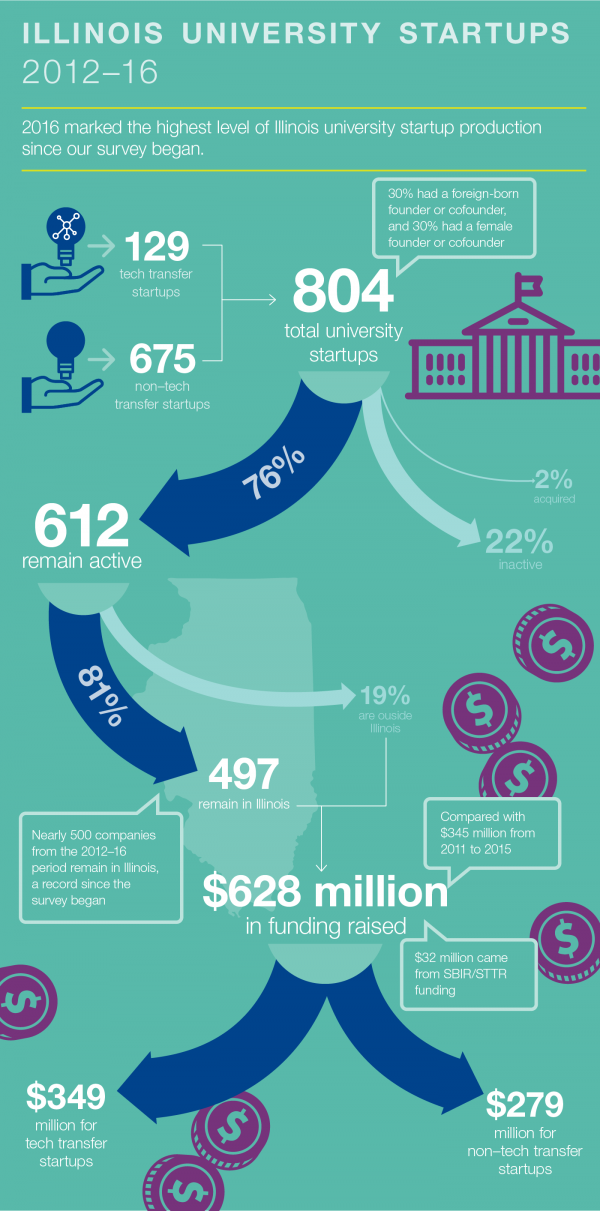
Part 1: Startup production reaches new heights
Over the past five years, student and faculty entrepreneurs in Illinois formed approximately 804 startups through university technology licensing, entrepreneurship programs and competitions, and other university initiatives. This number represents tremendous growth over the past several years. In fact, universities created roughly double the number of startups from 2012 to 2016 compared with 2009 to 2013—the first period measured by this survey.1
Much of the growth in startup production over the past several years can be attributed to the explosion of non–tech transfer startups—companies that do not license university technology. Illinois universities have continued to develop more robust entrepreneurship curricula, programs, competitions, and spaces that support student entrepreneurs of diverse disciplines.
From 2012 to 2016, 675 non–tech transfer startups were formed on Illinois university campuses, compared with 295 such startups from 2009 to 2013. Year-on-year trends also reflect this growth; the ISTC survey identified 251 non–tech transfer startups launched in 2016 compared with just 70 in 2012—an increase of more than 250 percent.
Company spotlight: BluSolar
BluSolar is a clean technology startup founded by students from Millikin University in Decatur, Illinois. Harnessing programs provided by Millikin’s Institute for Science Entrepreneurship and Center for Entrepreneurship, BluSolar offers research and development services to solar manufacturers or distributors seeking to enhance their products. BluSolar has demonstrated that cryogenic treatment results in a 25 percent improvement in wattage output due to microstructural changes to the photovoltaic solar cells. Thanks to this innovative process, BluSolar was recently selected as a finalist for the Clean Energy Trust (CET) Cleantech University Prize, sponsored by the US Department of Energy. Together with other finalist startups from across the Midwest, BluSolar will be able to test the market potential of its research while also receiving mentoring and networking support from CET.
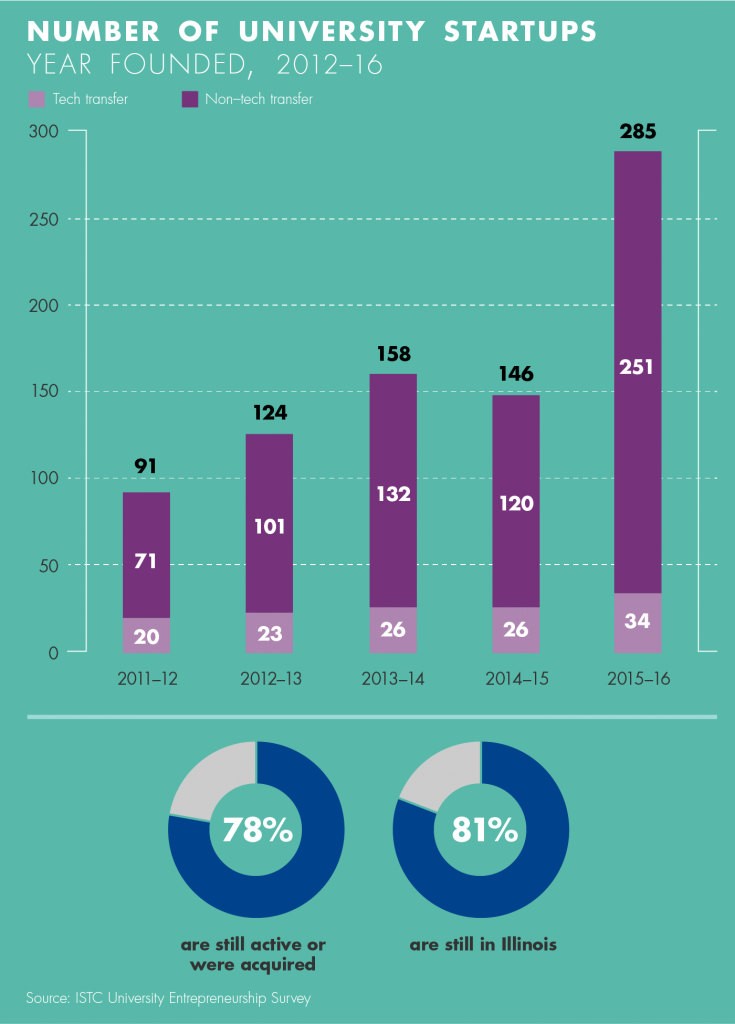
Universities support not only the development of these startups but also their continued success. More than three out of four (78 percent) startups formed from 2012 to 2016 are either still active or were acquired. And a record number of these companies have remained in the state, continuing to build their business and generate jobs and economic impact for Illinois. Of the 612 still-active startups founded from 2012 to 2016, 81 percent remain in the state compared with 73 percent of those founded from 2011 to 2015.
These university startups span a range of industries, from clean technology and advanced manufacturing to software and the Internet of Things. However, more than half of all tech transfer startups—those utilizing university intellectual property (IP)—are in the biomedical field.
Non–tech transfer startups are less concentrated in any one industry. Industries with the most non–tech transfer startups include software and applications, finance and business services, healthcare, food and agriculture technology, consumer products (such as clothing and retail), and education.
Founders also come from diverse backgrounds. Based on data from university partners, ISTC estimates that, for startups founded from 2012 to 2016, more than 30 percent have a foreign-born founder or co-founder. In addition, approximately 30 percent of these startups have a female founder or co-founder.
Company spotlight: FourKites
FourKites is a transportation logistics technology platform that uses real-time, cloudbased software to replace outdated tracking systems used by shippers and freight brokers. Founded by Northwestern University Kellogg School of Management student Mathew Elenjickal in 2013, FourKites won second place in the business products and services category at the 2014 NU Venture Challenge. Elenjickal also participated in the 2013–14 inaugural Zell Fellows Program and the 2013 Pritzker Group Venture Fellows program. In addition, FourKites recently won a Chicago Innovation Award and was named one of Chicago Inno’s “50 on Fire” after completing its $16 million Series A funding round in October 2016. FourKites was also named one of the “Best Entrepreneurial Companies in America” by Entrepreneur’s “2016 Entrepreneur 360™” list. In less than two years, FourKites has added 50 employees to its Chicago office and expects to add at least 50 more by the end of 2017.
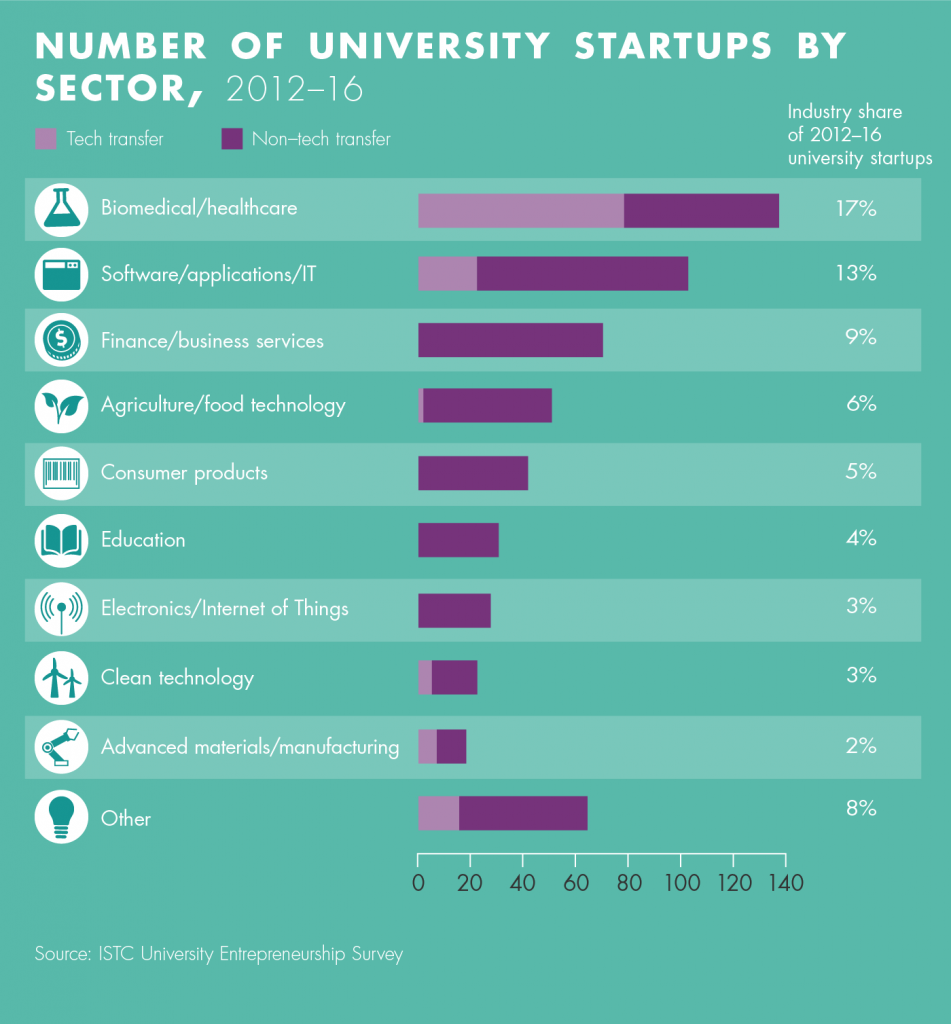
The important role of immigrant entrepreneurs
We recently highlighted the outsized role that immigrants play in Illinois’ tech economy—especially in entrepreneurship. In Illinois, immigrants make up less than 15 percent of the population but account for more than 22 percent of entrepreneurs.2 The proportion of startups founded by immigrants is even higher at Illinois universities. Based on available information from our university partners, we estimate that at least 30 percent of university startups created over the past five years had a foreign-born founder or co-founder.
The high proportion of startups founded by immigrants—both at Illinois universities and around the country—suggests a tremendous opportunity for US economic growth. Indeed, immigrants or children of immigrants established more than 40 percent of current Fortune 500 companies.3 Immigration reforms, such as the national startup visa and other policies to retain immigrant talent, should be implemented to make it easier for these founders to stay and grow their businesses.
Part 2: Universities increase entrepreneurial resources
Illinois universities are producing more startups due in large part to their intentional efforts to increase student, faculty, and staff access to entrepreneurial resources, including curriculum, programming, competitions, and seed funding. Many Illinois universities are delivering these resources through centralized spaces, which serve as hubs to facilitate cross-campus, interdisciplinary activity. These spaces include entrepreneurship centers, incubators, and affiliated technology parks. In addition to providing physical space to house companies, these spaces typically offer mentorship, connections to industry, and links to potential funders—helping entrepreneurs bring their products and services to market.
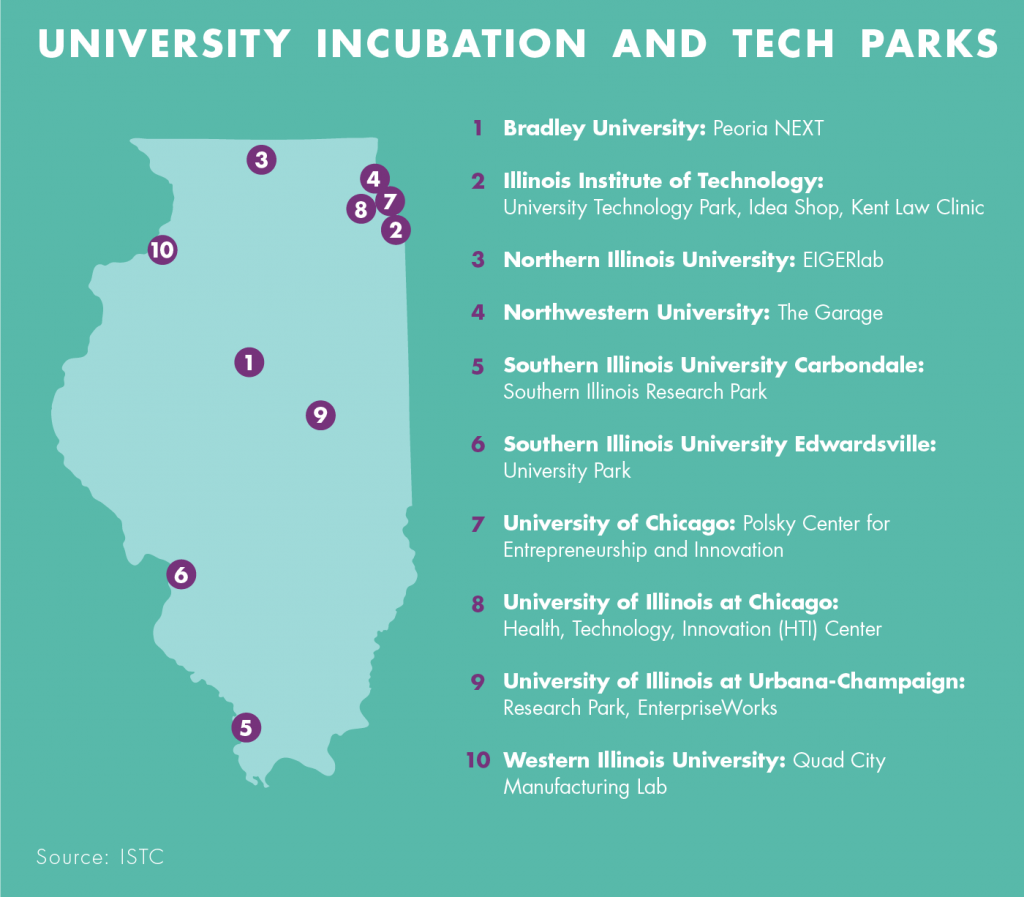
Over the past decade, universities have also increased their financial support of early stage university startups by creating proof-of-concept (POC) and innovation funds that provide startups with critical early-stage capital. These funds are managed by universities across Illinois, including Northwestern University, Southern Illinois University, the University of Chicago, the University of Illinois at Chicago, and the University of Illinois at Urbana-Champaign.
For example, as the venture capital arm of the University of Illinois, IllinoisVENTURES supports startups by providing POC funding as well as seed and venture capital to startups from both the University of Illinois and other Midwest institutions. Since its inception in 2002, IllinoisVENTURES has invested more than $185 million in entrepreneurial projects. Innovosource, a firm that connects companies and investors with startups, ranked IllinoisVENTURES as the best organization in gap funding for third-party capital attraction in 2016.4
University-supported funds also include the University of Chicago’s $20 million Innovation Fund and $25 million Startup Investment Program. The former provides funding for POC and early-business development while the latter supports early-stage companies with Series A, or initial, funding. To further support growth-stage startups,5 Chicago Booth Executive Program students and the Polsky Center for Entrepreneurship and Innovation also collaborated to start the angel investment group Hyde Park Angels. Since its inception in 2006, Hyde Park Angels has invested nearly $30 million in 50 startups. Similarly, Northwestern University has established two funds to accelerate the growth of university startups.
The $10 million N.XT Fund supports the commercialization of research-driven technologies while the $4 million NUseeds Fund supports earlystage student-founded startups. Additional funding sources include the University of Illinois at Chicago Chancellor’s Innovation Fund and Southern Illinois University’s Saluki Concept Fund.
Company spotlight: Cast21
Founded by a group of undergraduate engineering students at the University of Illinois at Urbana-Champaign, Cast21 uses the latest tools in medical technology to create a waterproof, breathable cast for broken bones. Initially conceived during a senior design project, Cast21’s concept was inspired by co-founder Jason Troutner’s experience in uncomfortable and irritating casts. Unlike traditional casts, Cast21’s solution has an open lattice design—inspired by the Chinese finger trap—that allows the wearer to wash and scratch the skin below the molding. Cast21 participated in UIUC’s iVenture Accelerator program, the Cozad New Venture Competition, and the ZeroTo510 medical device accelerator program. The company has also presented at the Hello Tomorrow Conference in Paris, as well as at Chicago Techweek. Currently located at UIUC’s EnterpriseWorks incubator, Cast21 has raised more than $800,000 to support further product development.
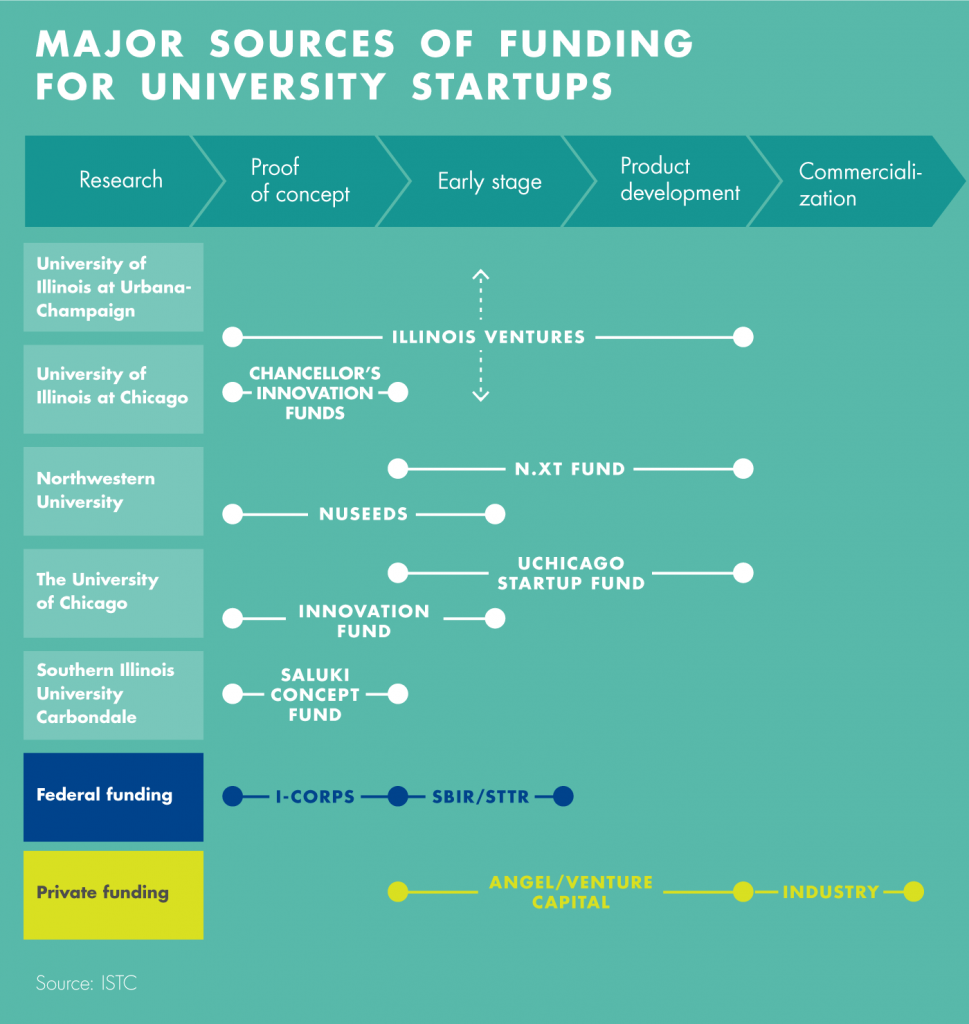
Company spotlight: Omnipointment
Founded by Illinois Institute of Technology undergraduate student Vinesh Kannan in early 2016, Omnipoinment is a web and mobile platform that makes it easier for students to coordinate their schedules. Unlike similar platforms, Omnipointment’s collaborative reports allow instructors to track and improve team dynamics among their students. Shortly after its founding, Omnipointment received seed funding from the Omaha-based accelerator Straight Shot. It was also selected as a finalist at the Future Founders U.Pitch competition. Now used by students at more than 60 universities, Omnipointment was recently named a top-eight digital student startup by Student Startup Madness and selected to pitch at this year’s South by Southwest festival.
Illinois universities stepping up entrepreneurship initiatives
Universities around the state stepped up efforts to increase their offerings to entrepreneurs in 2016. With these efforts paying dividends, we highlight some of the key initiatives taking place across the state.
DePaul University In 2016, the Coleman Entrepreneurship Center at DePaul University opened a new space within its Chicago Loop campus, expanding resources available to DePaul entrepreneurs. The Coleman Center also joined the Chicago 1871 incubator space and community, allowing university entrepreneurs greater access to Chicago’s startup community.
Illinois Institute of Technology The Illinois Institute of Technology (Illinois Tech) broke ground on the new Ed Kaplan Family Institute for Innovation and Tech Entrepreneurship in 2016. This new space will house unique facilities and equipment for entrepreneurs, including media labs, classrooms, collaborative hubs, emerging technologies, and maker spaces. The Kaplan Institute will also enhance the activities of Illinois Tech’s Entrepreneurship Academy, Jules Knapp Entrepreneurship Center, and Idea Shop. Also contributing to Illinois Tech’s growth in entrepreneurship is the groundbreaking IPRO initiative, which provides students with an innovative and collaborative approach to real-world, project-based experiences.
Illinois State University Illinois State University (ISU) continues to grow its entrepreneurship offerings through the George R. and Martha Means Center for Entrepreneurial Studies, which supports entrepreneurs at ISU and in the greater Bloomington-Normal community. This support includes the yearly Startup Showcase and Means Center Accelerator Program, which each aim to connect startups with support resources and help them develop connections with potential investors, mentors, and the larger business community. ISU also announced a new partnership with the Bloomington-Normal Angel Investor Network (BNAIN) in 2016, bringing together innovation and capital investment to support the development of ideas, emerging technologies, and businesses in the Bloomington-Normal community.
Loyola University In 2016, Loyola’s Quinlan School of Business launched the Urban Social Benefit Incubator. Staffed with students, staff, and faculty from across the university, the incubator is overseen by the leadership of Quinlan’s Loyola Business Leadership Hub. Services include providing counsel, organizing resources, and helping entrepreneurs create strategic business plans to better serve target audiences in marginalized communities.
Northern Illinois University Through its new and innovative entrepreneurship and social responsibility program, Northern Illinois University (NIU) offers students an education in business that focuses on launching new ventures and fostering innovation and social impact. The program, which provides students with hands-on entrepreneurship experience, internships, and access to an extensive alumni network, was named a finalist in the Excellence in Entrepreneurship Education Awards by the International Council for Small Business in 2016.
Northwestern University Launched in June 2015, The Garage, Northwestern’s hub for student entrepreneurship and innovation, saw tremendous growth last year. Since its inception, The Garage has incubated more than 200 student-founded startups and seen more than 1,000 visitors each month for classes, office hours, events, and workshops. In addition, The Garage offers students a full-time residency program, including 24/7 access to office space, guidance from business mentors, and weekly “family dinners” for student entrepreneurs. In addition to The Garage, Northwestern’s Innovation and New Ventures Office (INVO), the Farley Center for Entrepreneurship and Innovation at the McCormick School of Engineering, the Levy Entrepreneurial Institute at the Kellogg School of Management, and the Donald Pritzker Entrepreneurship Law Center at the Pritzker School of Law all provide innovative academic curricula and programs to support entrepreneurship.
Southern Illinois University Southern Illinois University (SIU) continues to support entrepreneurs through the Southern Illinois Research Park and Center for Innovation. This support includes the University Innovation Fellowship Program and Saluki Ventures, which offer entrepreneurs hands-on training, consulting services, and mentorship. SIU also supports startups through the Small Business Incubator (SBI) program, housed in the Dunn-Richmond Economic Development Center, which provides a full range of business development assistance for entrepreneurs, including one-on-one consulting, workshop and training events, and business-plan development.
University of Chicago In 2016, the University of Chicago established a newly expanded and unified Polsky Center to increase opportunities for entrepreneurship education, venture creation, and research commercialization. Made possible through a $35 million gift by University of Chicago alumnus Michael Polsky, the center now includes the Polsky Exchange, which is providing incubation space and a suite of programming and resources to better support and connect entrepreneurial activity across campus and with Argonne National Laboratory and Fermilab. Last year also marked the 20th year of the New Venture Challenge (NVC), the university’s flagship capstone program to support new business creation, which was recognized as the top-ranked university accelerator program in the nation by the Seed Accelerator Ranking Project.6 The program has launched more than 160 companies and now offers four tracks: traditional NVC, social NVC, college NVC, and global NVC. The growth of the NVC, along with the addition of the Polsky Summer Accelerator and Polsky Founders’ Fund Fellowship programs, have contributed to the University of Chicago’s significant increase in entrepreneurial activity.
University of Illinois at Chicago The Innovation Center at the University of Illinois at Chicago (UIC) is a collaboration, education, and incubation center helping connect student research with industry. Focusing on interdisciplinary solutions for medical challenges, the UIC Innovation Center aims to help students move from ideation to development.
University of Illinois at Urbana-Champaign The University of Illinois at Urbana-Champaign (UIUC) has been adding nationally recognized entrepreneurship pipeline programs to assist more students, faculty, and staff across departments in launching new companies. These programs include UIUC’s iVenture Accelerator, which gives entrepreneurs the opportunity to work full-time on their startups during the summer, with access to a coworking space, mentorship, and workshops. UIUC is also expanding its entrepreneurship curriculum by offering a new innovation, leadership, and engineering entrepreneurship degree program. In addition, growing initiatives like the Cozad New Venture Competition, Illinois Proof-of-Concept Funding Program (I-POC), and I-Start Professional Service Assistance Program are all contributing to the expansion of entrepreneurship at UIUC.
Part 3: Funding raised and access to capital
Commensurate with the increased number of startups founded in the past five years, Illinois university startups have also raised more funding. Over this period, startups established at Illinois universities have raised $628 million, compared with $345 million from 2011 to 2015.7 The increase in funding shown in our data represents an impressive positive trend for university startups, especially given the decrease in venture capital activity on the national level in 2016.8
Unlike previous years, from 2012 to 2016 the amount of funding raised by tech transfer startups ($349 million) exceeded that raised by non–tech transfer startups ($279 million). The growth of funding for tech transfer startups was primarily driven by four biomedical companies—Aptinyx, Corvidia, Exicure, and Revolution Medicines—which collectively raised more than $200 million in 2016. The increase in funding raised by tech transfer companies underlines the value of university research and its potential for commercialization.

Although access to capital is often cited as a challenge for Illinois startups, 78 percent of active university startups that received funding have remained in Illinois, illustrating the potential for startups to raise capital in the state. University entrepreneurship funds that help startups bridge the funding gap between research and commercialization—and attract third-party investment—are also playing a pivotal role in keeping these startups in the state.
Despite these positive indicators, access to capital remains a challenge for growth-stage startups. Companies that have raised more than $5 million in funding, well above the $790,000 average, are still more likely to be located outside Illinois. Improving access to capital for growth-stage startups in Illinois would make a significant difference in keeping more successful startups in the state.
Company spotlight: BallotReady
BallotReady is a nonpartisan online voter guide that enables voters to be informed about every race and referendum on their ballot. Started in Chicago in 2015, BallotReady received foundational support from the University of Chicago Institute of Politics and the Polsky Summer Accelerator program, and the company completed both the Polsky site and national I-Corps programs. In addition, BallotReady received investment from the University of Chicago Innovation Fund and the Harris Center for Policy Entrepreneurship, along with funding from the National Science Foundation and the Knight Foundation. Thanks in part to this support, BallotReady won both the John Edwardson ‘72 Social New Venture Challenge and the University of Chicago Cognitive Computing Challenge. With guidance from a bipartisan board of advisers led by Democrat David Axelrod and Republican Mike Murphy, BallotReady is live in 12 states, covers more than 15,000 candidates, and has more than 1 million site visits to date. By the 2018 midterm elections, BallotReady will cover every state, helping all citizens be more informed about the votes they cast.
The critical role of I-Corps and SBIR/STTR funding
The federal government has played an instrumental role in serving as a catalyst for developing and funding startups in the state and across the nation through a number of key programs. One such program is the National Science Foundation’s I-Corps program, which is designed to help entrepreneurs commercialize their innovations by validating commercial opportunities, providing business training, and fostering connections to private partnerships and additional funding. I-Corps programs are facilitated through university sites and regional nodes. In Illinois, both the University of Illinois at Urbana-Champaign (UIUC) and the University of Chicago are I-Corps sites, with UIUC also serving as part of the Midwest node along with Purdue University and the University of Michigan. Over the past several years, the I-Corps program has grown substantially in Illinois. In fact, the ISTC University Entrepreneurship Survey includes more companies formed in 2016 as a result of I-Corps participation than in the previous four years combined.
In addition to assisting in the creation of startups, I-Corps is helping early-stage university startups connect to vital Small Business Innovation Research (SBIR) and Small Business Technology Transfer (STTR) funding. The SBIR and STTR programs are offered by a number of federal agencies to encourage small companies to engage in R&D that has the potential for commercialization. University startups formed through I-Corps from 2012 to 2015 were more than seven times more likely to receive SBIR or STTR funding compared with companies that did not participate in I-Corps. This relationship between I-Corps and SBIR/STTR funding is especially important as the state looks to increase the amount of funding it receives from these programs. From 2012 to 2016, Illinois companies attracted $214 million in SBIR/STTR funding—only 14th among all states. The continued growth of the I-Corps program in the state offers a clear path for improving those figures.
Company spotlight: Veriflow
Created by University of Illinois at Urbana-Champaign computer science faculty and PhD students, Veriflow is the first networking company to use continuous network verification to eliminate network outages and vulnerabilities. Veriflow developed and vetted its innovative approach while receiving incubation support from EnterpriseWorks at the University of Illinois Research Park. The startup also participated in ISTC’s Corporate-Startup Challenge, through which it secured a pilot project with Archer Daniels Midland. This past year, Veriflow won the Barclays 2016 Open Innovation Challenge, beating out more than 100 technology companies from around the globe. And in 2017, Veriflow made it to the final 10 in the RSA® Conference Innovation Sandbox Contest for most innovative security startups.
Part 4: A detailed look at tech transfer
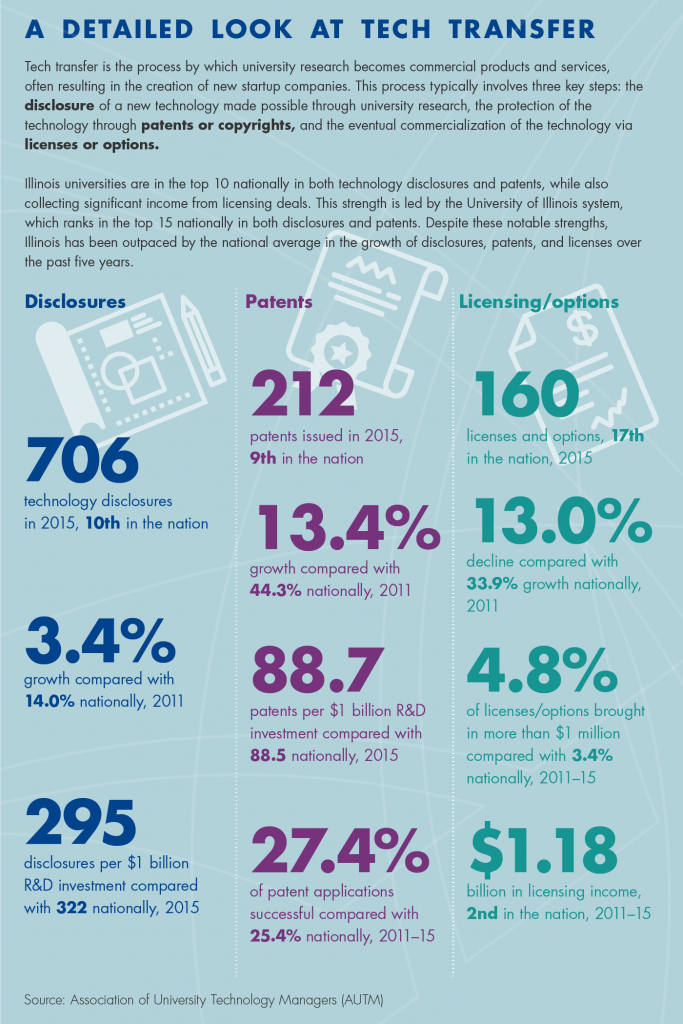
Part 5: Illinois alumni continuing entrepreneurship
Although more students are choosing to pursue entrepreneurial activities while on campus, Illinois also has a growing base of alumni entrepreneurs who have launched companies later in their careers. To assist them, Illinois universities are stepping up initiatives to increase entrepreneurship offerings to alumni. These efforts include welcoming alumni into on-campus entrepreneurship programs, providing online curriculum, connecting potential entrepreneurs with active startups, providing workshops, and establishing local entrepreneurship groups around the country.
To examine the extent of entrepreneurship activity among Illinois alumni, the Index partnered for the first time with PitchBook—a leading provider of startup and venture capital data. From 2012 to 2016, alumni from Illinois universities founded 1,106 companies and raised more than $9 billion in capital. In addition, PitchBook ranked Northwestern University, the University of Chicago, and the University of Illinois at Urbana-Champaign among the most proficient global producers of alumni entrepreneurs.9
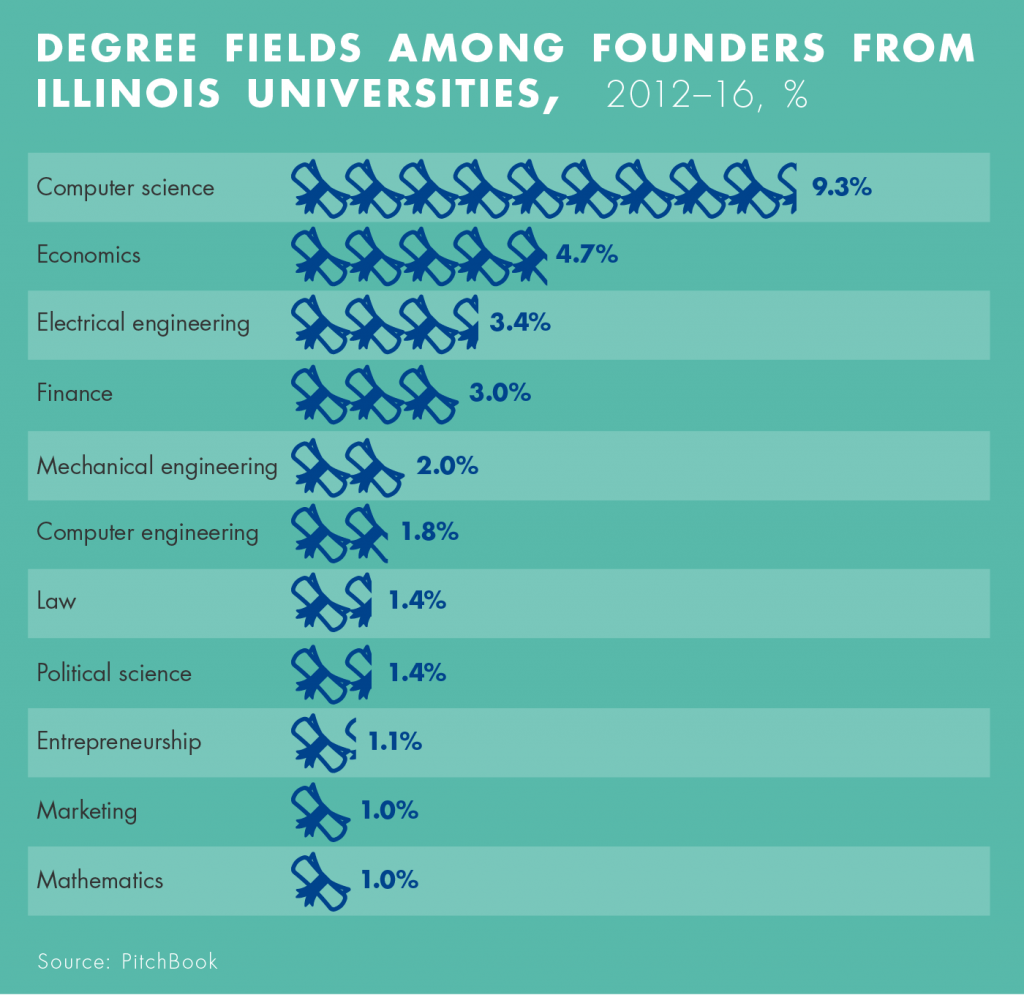
Alumni startup founders from Illinois universities hold degrees in more than 400 concentrations. And with no single field making up more than 10 percent of the degrees received, it’s clear that Illinois entrepreneurs come from many backgrounds. About half of the top ten degree fields were in STEM, with both computer science and engineering well-represented.
About the research
Illinois universities make a tremendous impact on innovation and entrepreneurship through a broad sweep of programs and initiatives. As a result, quantifying the scope of university-aided entrepreneurship is difficult. To take on this challenge, the Index approaches this task from several angles:
First, ISTC’s yearly University Entrepreneurship Survey is used to create a database of startup companies founded in the past five years by current students, faculty, and staff of Illinois universities.10 This database includes self-reported data such as company founder, year founded, company location, and total funding raised. To ensure that all available and accurate information is included, responses are vetted against established startup databases Crunchbase and PitchBook, as well as National Science Foundation and Small Business Administration databases.11
Second, the Index tracks the technology transfer (tech transfer) process as university innovations move from discovery to commercialization. Data on tech transfer at Illinois universities comes predominantly from the Association of University Technology Managers (AUTM) Licensing Survey, as well as data on company formation from ISTC’s University Entrepreneurship Survey.
Last, for the first time since we began measuring university entrepreneurship, this issue of the Index also highlights the role of companies started by alumni of Illinois universities through data provided by PitchBook. This includes data on company formation, capital raised, and degrees held by founders.
Conclusion
Since the ISTC University Entrepreneurship Survey began in 2013, Illinois universities have recorded steady growth in startup production. In 2016, that growth reached record heights. Through ever-increasing university resources—such as incubators and tech parks, startup funds, and innovative curriculum—students, faculty, staff, and alumni have access to more entrepreneurial resources than ever before. Universities are also making a more concerted effort to track their startup companies, ensuring startups that may have previously slipped through the cracks are now receiving the resources they need to be successful.
With universities producing startups at record levels, it’s now up to the state to provide these companies with the resources they need to stay in Illinois and help expand the state’s economy. For early-stage companies, the continued growth of the National Science Foundation’s I-Corps program is critical to provide startups with valuable mentorship and connections to further funding, such as SBIR/STTR. In addition, though Index research demonstrates the potential for startups to raise significant funding in Illinois, too many growth-stage startups are still leaving the state in search of funding. To encourage those companies to remain in Illinois, it’s critical for the state to expand initiatives that connect growth-stage startups with potential funders.
The state should also make strategic efforts to connect companies with Illinois’ growing non-university entrepreneurial community. This ecosystem includes Illinois’ network of incubators, accelerators, and organizations dedicated to supporting and funding entrepreneurs—such as Built in Chicago, Clean Energy Trust, Energy Foundry, iBIO Institute, the Illinois Technology Association, and facilities such as 1871, MATTER, mHUB, and TechNexus. Facilitating handoffs between university and non-university entrepreneurial resources can help ensure startups have consistent support as they grow. And connecting entrepreneurs to Illinois’ vast corporate community—through innovative programs such as ISTC’s Corporate-Startup Challenge—is essential to supporting startup growth in the state.
[All infograph credits to Leff Communications.]
- The 2012–16 time period represents school year 2011–12 to school year 2015–16, the five-year time period for which the data were collected. ↩
- “The Contributions of New Americans in Illinois,” New American Economy, August 2016. ↩
- Dane Stangler and Jason Wiens, “The Economic Case for Welcoming Immigrant Entrepreneurs,” Ewing Marion Kauffman Foundation, updated September 8, 2015. ↩
- Mind the Gap: The Technology and Start-up Gap Funding Report, Innovosource, 2016. ↩
- Growth-stage startups are those that have shown development progress, often by taking a product or service to market, and are typically seeking higher funding amounts from angel or venture capital groups. ↩
- Susan Cohen, Daniel Fehder, and Yael Hochberg, “2016 Accelerator Rankings,” Seed Accelerator Rankings Project, 2016. ↩
- The actual figure for funds raised from 2012 to 2016 is even larger, as startups founded before 2011–12 are not included even though they may have raised capital in the past five years. ↩
- “4Q 2016 PitchBookNVCA Venture Monitor,” PitchBook, January 11, 2017. ↩
- “2015–2016 PitchBook Universities Report,” PitchBook, September 24, 2015. ↩
- The ISTC Entrepreneurship Survey was sent to 12 Illinois universities. Respondents to this year’s survey include the Illinois Institute of Technology, Northern Illinois University, Northwestern University, Southern Illinois University, the University of Chicago, the University of Illinois at Chicago, and the University of Illinois at Urbana-Champaign. ↩
- Although we believe the ISTC University Entrepreneurship Survey provides the most comprehensive data on university startups available, it cannot capture the entirety of university startup activity. Therefore, the findings presented in this Index are best estimates based on the latest available information. ↩
Archive
2018 - University Entrepreneurship Index
Illinois Retains More Startups Than Ever Before
2017 - University Entrepreneurship Index
Illinois university startups surge to record level
2016 - University Entrepreneurship Index
A detailed look at university startup creation, tech transfer, and local funding trends
2015 - University Entrepreneurship Index
Illinois universities spur innovation through technology transfer and entrepreneurship
2014 - University Entrepreneurship Index
Dynamism in Illinois: Tracking technology development at universities and research institutions from inception to commercialization
